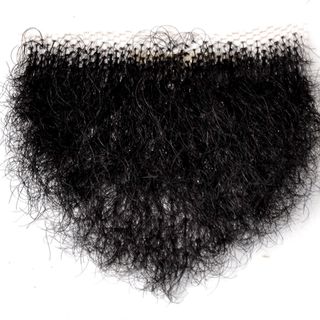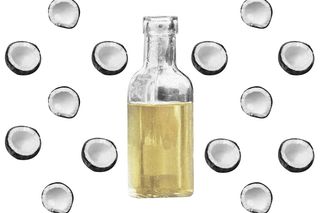
Untrending: Coconut Oil Is No Cure‑All, But It Has Some Benefits
Coconut oil is neither “pure poison,” as one epidemiologist called it, nor a life-changing elixir. But it sure does taste great and make hair smooth.

In Untrending, we side-eye the latest fads so we know what we’re getting ourselves into — and what (if anything) we’re getting out of them.
If there were a patriotic nut, the coconut would be India’s mascot. Many a grandparent has waxed eloquent about coconut’s utility — from its tough coir (outer husk), used to make mats and thatch roofs, to its delicious, hydrating water. But, of all the delights a coconut can offer, coconut oil takes the crown, according to a host of taste, health, and beauty benefits claimed by all-knowing grandmothers and wellness blogs and publications..
But coconut oil’s supposed benefits have recently caused controversy. Karin Michels, an epidemiologist at UCLA, gave a 2018 speech in Germany calling coconut oil one of the “worst things you can eat” and “pure poison.” The backlash was so extreme that the lecture was removed and India’s horticulture commissioner emailed the dean at Harvard’s T.H. Chan School of Public Health (Michel’s previous workplace) to demand a retraction.
While nutritionists and many cultures’ centuries of lived experience clearly confirm that coconut oil is no deadly poison, it isn’t the metaphorical fountain of wellness either. Coconut oil has some proven benefits, and that’s all. It can’t help you lose weight, it shouldn’t be your face moisturizer, it shouldn’t be your ideal lubricant, and it most certainly can’t replace brushing your teeth.
Related on The Swaddle:
There’s No Such Thing As a Superfood
Here’s what coconut oil is — an edible oil extracted from the mature coconuts’ meat. Consuming coconut oil is linked to weight loss because people believe the medium length chemical structure of some of the oil’s fatty acids makes it easier to digest. However, this is not true — the majority of coconut oil’s composition (49%) is made up of lauric acid, which is as hard to digest as oils with longer fatty acids. Plus, coconut oil is mostly comprised of saturated fats, which will increase the body’s cholesterol levels. Coconut oil has around 12 grams of saturated fat per tablespoon. For context, a tablespoon of butter has around 7 grams. This means coconut oil is an unhealthy oil to cook in, and increases the body’s risk for developing cardiovascular disease.
Coconut oil is also touted as a means to enhance dental health via the ayurvedic (traditional Indian medicine) practice of oil pulling. While there’s not enough convincing scientific evidence to support the practice, dentists recommend it as a harmless additional activity post brushing to potentially reduce bad breath.
Related on The Swaddle:
Should We All Quit Sugar? Maybe Not.
Beyond health, coconut oil is also revered as a beauty cure-all. People use coconut oil to condition their hair, to moisturize their skin, and to get rid of chapped lips.
With respect to hair, coconut oil is actually a pretty great hair-oiling choice. According to an explainer by Michelle Wong, chemistry PhD and founder of Lab Muffin — a beauty education project, using coconut oil before washing hair creates a protective layer over it, leading to less water absorption by hair cuticles and so, fewer split-ends/breakage. Using coconut oil post-hair-wash lubricates the strands, causing less breakage during hair-combing. The reason why coconut oil works great is that its relatively small molecular structure (in comparison to other oils) helps it enter the hair shaft and protect hair cuticles better. Plus, the oxygen atoms contained in coconut oil bond well with hair proteins, further helping solidify the protective oil layer during a hair wash.
However, when it comes to moisturizing benefits, coconut oil isn’t ideal. Coconut oil is a highly comedogenic product, which means it’s a pore-clogging, pimple, and acne generator. This is mostly limited to a person’s face — coconut oil is a decent body moisturizer, though it always helps to check with a dermatologist in case of any skin conditions before using coconut oil to moisturize. As for lips, dermatologists say coconut oil is a promising emollient, which means it helps trap moisture into the lips for a long period of time. Therefore, it could help as a simple home remedy for chapped lips.
As for choosing coconut oil to lubricate before and during sexual intercourse — don’t. This is because coconut oil will dissolve latex condoms and mess with the vagina’s pH levels — which increases the risk of a yeast infection.
Coconut oil is just a regular type of edible oil — it tastes nice, it has some benefits, but it has neither excess benefits nor excess toxicity. As always, reasonable usage is ideal.
Aditi Murti is a culture writer at The Swaddle. Previously, she worked as a freelance journalist focused on gender and cities. Find her on social media @aditimurti.
Related


Why Some People Are Really Bad at Remembering Names
